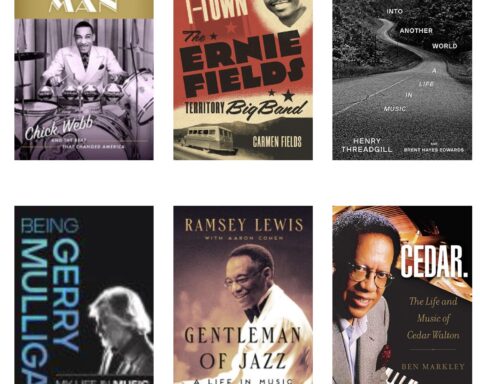It’s been just over a year that I have semi-officially considered myself a jazz writer. It started with this post, which began as an essay for a graduate course on jazz and film (I am currently finishing my MA in Jazz History and Research at Rutgers-Newark, the only masters program currently offered in jazz history worldwide). Since then I’ve been writing about jazz more regularly, mostly at my blog, Lubricity. I’ve also encountered other jazz enthusiasts who participate in the discourse in many different ways: through blogs such as A Blog Supreme, Jazzblog.ca and Nextbop, through conferences and lectures, through informal conversations and interviews, and via the jazz-research listserv (I know, that is so ’90s). I even signed up as a student member of the Jazz Journalists Association, where I have met a number of talented and like-minded jazz writers, despite never having read a jazz magazine.
Although it’s exciting to be on the front lines of the new discourse, I often find myself frustrated by the limited perspectives and lack of dialogue within the broad community of jazz lovers. As someone with a foot in both the historically oriented and contemporary-leaning worlds, it can be difficult to define a perspective that takes both into account. The difficulty came into relief during two recent online conversations in which I participated: first a response to this post at Nextbop by Jared Bailey, and second a comment on the jazz-research thread two days later decrying the decay of editorial standards thanks to what the writer called the “twittering hive mentality.” (I won’t post the full comment here out of respect for the privacy of the listserv.)
[pullquote]It is always a challenge to avoid the extremes of naive youthful exuberance and hardened cultural elitism.[/pullquote]
Bailey’s article begins with the cliché “Jazz is America’s music,” laments the current situation for young jazz musicians and blames stuck-in-the-mud teachers and evil record companies for the predicament. To me, this stood out as the sort of naive rambling that gives online writing its reputation for sloppiness and partisanship. Considering that Nextbop is becoming such a successful vehicle for representing young jazz fans’ perspectives online, I was dismayed. Feel free to read my full comments at the site, where I wrote:
This melodramatic and shallow anti-corporate rhetoric doesn’t do much to highlight what is happening in the jazz world these days — good or bad. The myth of artistry versus commerce is timeworn and has always failed to be particularly fruitful, except perhaps to galvanize diehard partisans.
Our mission ought not to be as soldiers “fighting the good fight for a dying music” but as artists working with the complex canvas of contemporary society, rooted in the unique history and tradition of jazz, mediating those values in today’s complex musical landscape.
Editor-in-chief Anthony Dean-Harris has since followed up with a more measured perspective that speaks to the site’s mission and articulates a similar perspective:
Jazz has the same do-it-yourself attitude of punk rock. It has the same epic feel of bands like Led Zeppelin. It has the stripped down nature of bluegrass. It has the same smoothness of R&B. It’s practically half the samples you ever hear for anything in hip-hop. It is the every genre, you just have to realize it.
On the historical-academic side, I took issue two days later with a commenter on the aforementioned jazz-research listserv post, who wrote the following:
Even the Atlantic Monthly, that former pinnacle of thoughtful, articulate, crisp and sparkling writing, has permitted the encroachment of the tremulous, twittering, hive mentality.
The perception of a decline and the blaming of Twitter rang hollow, as did the implication that new trends in journalism ushered in by a new generation are somehow unwelcome. And the tone, typical of a things-ain’t-what-they-used-to-be meme that is far too common on the list, smacked of cultural elitism (the post ended by asserting dismissively, “Most of their readers probably equate jazz with Chris Botti, anyway”).
Having followed the list for over a year by this point, I felt emboldened to chime in, writing:
… The stereotype of the lazy, entitled, living-at-home, twittering slacker that is being applied to people of my generation (including, by extension, me) is both unfounded and frustratingly pervasive.
Many of my peers in the Rutgers Jazz History and Research program (as well as recent alumni) are passionate, dedicated and hard-working jazz scholars and musicians who follow this list, so [name withheld]’s implication that “us” refers exclusively to a greying cadre of cultural guardians is misleading and misguided. And yes, some of us even use Twitter (the brave among you can follow me @arodjazz) without suffering from brain damage or “hive mentality.” Few of my peers who follow this list ever post here in part because of the unwelcoming atmosphere that comments such as [name withheld]’s create.
In my time at Rutgers, I have had wonderful and fruitful interactions with musicians, collectors, fans and scholars of all ages. Engaging in deep and thoughtful discourse about the music with fellow enthusiasts, regardless of age or other potentially divisive factors, has been one of the most rewarding aspects of my time here, and this list has been a helpful mechanism for those exchanges.
Please, keep the door open for me and my fellow aspiring scholars by keeping in mind the diversity of the group that reads this list.
I am very grateful to have spent the past year immersing myself in written discourse on jazz. It will always play an important role in how we hear the music, yet it is always a challenge to avoid the extremes of naive youthful exuberance and hardened cultural elitism, both of which create a less-than-desirable frame for the music. By striving to keep all jazz lovers in mind, we can achieve a much better understanding of the music that we love.





Admirable content aside, Alex writes better than many a "pro"! I hope he'll keep it up, along with the sliding....